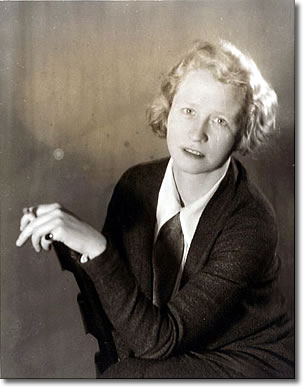Edna St Vincent Millay (1892-1950), known as Vincent by preference, was a prize-winning, published poet by the age of 14 in her hometown of Camden, Maine.
Her mother and father separated and divorced when Vicent was a child, and her mother and two sisters lived on the edge of poverty.
Already an intelligent, strong-willed, outspoken red-haired beauty in her teens, she was openly bisexual in high school—in the early 1900s.
In 1912 her poem "Renascence," published in the prestigious literary magazine The Lyric Year, won a prize, national recognition for the poet, and the admiration of a wealthy arts patron who offered to pay for her education at Vassar College.
After Vassar, Millay moved to Greenwich Village in New York City, wrote plays, became involved in the theater, and continued to write poems and stories. Her life, then and later, is summed up in this short gem from A Few Figs from Thistles (1920):
My candle burns at both ends; |
Her poem "The Ballad of the Harp-Weaver" won the Pulitzer Prize for Poetry in 1923, the same year in which she married widower Eugen Jan Boissevain (1880-1949). He and Millay had what would later be termed an "open marriage"—both of them had affairs with others during their 26-year marriage.
From 1925 until their deaths, the couple based their lives at called Steepletop, their farm in Austerlitz, New York, their home. Millay died at the age of 58 on the 635-acre (257-hectare) New York farm estate 12 miles (19 km) west of Stockbridge MA (map), and is buried there.
The original farmhouse is now a museum, the Edna St Vincent Millay Society, open to the public from May into October. Part of the property is the Millay Colony for the Arts, dedicated to fostering the work of young poets (one of whom was the poet Mary Oliver).
Perhaps Edna St Vincent Millay's finest poems are her sonnets, but she also wrote verse dramas, translations, the libretto for the opera The King's Henchman by Deems Taylor, and stories (under the pseudonym Nancy Boyd).

